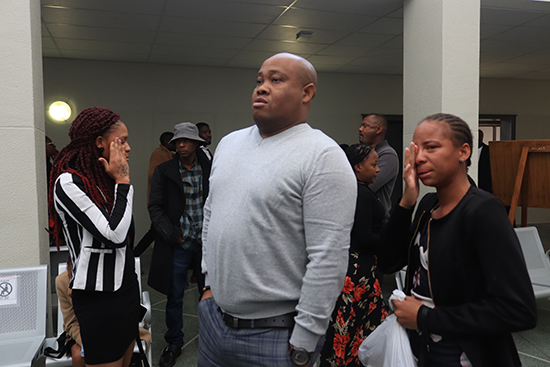Roland Routh
An uproar erupted at the Windhoek High Court yesterday when Judge Christi Liebenberg exonerated Azaan Madisia (30) and her brother and co-accused Steven Mulundu (25) on charges of murder and robbery.
Following the much-awaited judgement, family and friends of Shanon Wasserfall were visibly upset and verbally demanded justice for Shanon while labelling the judgment as “a farce”. In his decision, Judge Liebenberg found the State did not prove beyond reasonable doubt that Madisia and Mulundu were culpable for the death of
Wasserfall.
However, on their own admission, the judge convicted both on a charge of defeating the course of justice and Madisia alone on two counts of fraud. Madisia and Mulundu were on trial for the murder and robbery of Wasserfal – a close friend of Madisia – in April 2020. Madisia reported Wasserfall missing and allegedly also took part in some of the searches conducted to find her.
Both pleaded not guilty to charges of murder and robbery with aggravating circumstances but pleaded guilty on a charge of defeating or attempting to defeat the course of justice. Madisia pleaded guilty to two additional counts of fraud.
Judge Liebenberg found that should Madisia’s evidence be rejected as false, then the State’s case would be plunged into falsehood.
He noted that while her evidence was not truthful and reliable in all respects, it is the only version that is before Court. “Despite shortcomings in the evidence of accused one, her version of events that led to the death of the deceased stands unrefuted,” the judge remarked.
He went on to say that based on all the evidence adduced, the version of Madisia as to what led to the victim’s death is reasonably possibly true and her actions are not found culpable.
As for the charge of robbery and its alternative of theft, the judge said there is no evidence the accused committed the offences.
He reasoned the accused had no intent of appropriating the victim’s belongings and only wanted to dispose it of to avoid being linked to Sharron’s disappearance. Those actions were covered by the charge of defeating, the judge said.
As for the charge of defeating the course of justice, he said the offence was completed because due to their actions, the body of the victim was at an advanced stage of decomposition when discovered, which made determination of the cause of death impossible.
Judge Liebenberg said there is no clear evidence from which the Court could justifiably infer that the killing of the victim was intentional.
“It appears to me that the circumstances that led to the death of the deceased could be described as a freak accident and something accused 1 could not have foreseen,” the judge said and continued: “Her reaction thereto appears reasonable in the circumstances and, as admitted, prompted the making of wrong decisions to keep it a secret and to rather dispose of the body”.
He further said he is not convinced that Madisia intentionally and unlawfully killed Wasserfall. During her evidence in defence, Madisia claimed Wasserfall’s death was a result of a tragic accident. She said she and the victim were involved in a pushing match when the victim fell over her bed and hit her head on a wall.
She denied that she and Mulundu conspired to kill Wasserfall, and insists that Mulundu only helped her to get rid of the body. Madisia and Mulundu was represented by Legal Aid lawyers Albert Titus and Tanya Klazen, respectively, and the State by Henry Muhongo.



